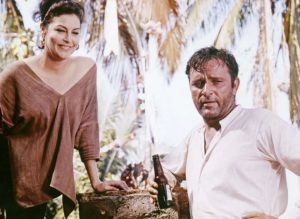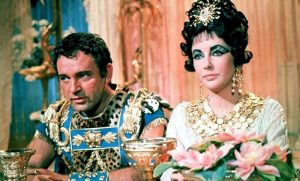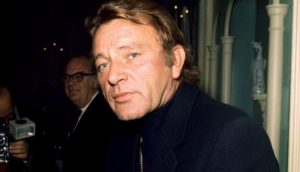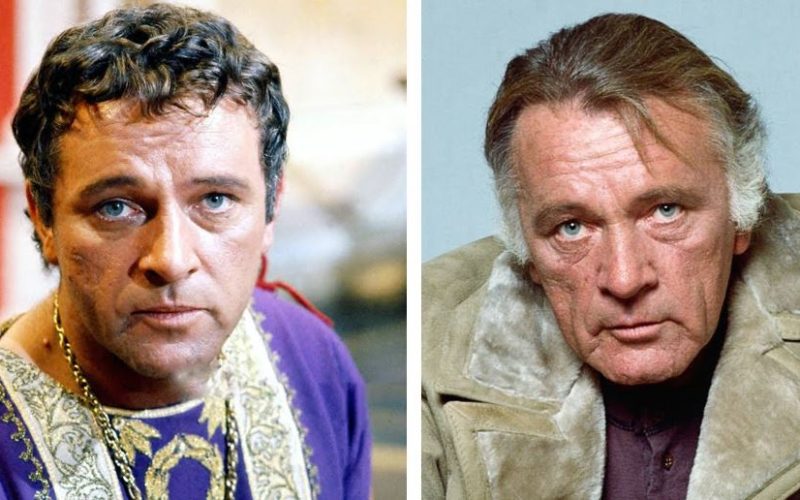For many who grew up admiring Richard Burton’s towering presence on screen and his thunderous voice on stage, the news of his death in 1984 came as both a shock and an inevitability. Those who followed his career knew he had lived a life of brilliance but also excess, a story of talent so fierce it could never truly be contained.
What really happened to the Welsh star whose legacy still echoes through Hollywood and the West End? As we look back, we aim to uncover the truth behind Richard Burton’s cause of death and what led to the tragic end of one of Britain’s greatest actors.
Who Is Richard Burton?

Image – Source
Richard Burton, born Richard Walter Jenkins Jr. on 10 November 1925 in Pontrhydyfen, Glamorgan, Wales, was the twelfth of thirteen children in a working-class Welsh-speaking family.
His father was a coal miner known for his drinking, and his mother, Edith Maude Jenkins, died when Richard was just two years old. After her death, he was raised by his elder sister Cis and her husband in Port Talbot, a town known for its grit and steel.
Burton’s upbringing was humble, but he stood out early due to his eloquence, love of literature, and baritone voice. A pivotal figure in his life was Philip Burton, a teacher who mentored and later became his legal guardian, encouraging him to pursue a scholarship at Oxford and a career in the performing arts.
Career
He began acting in radio plays and small theatre productions before gaining significant attention with Shakespearean performances.
His role as Prince Hal in Henry IV and later as Hamlet at The Old Vic marked him as a formidable talent. Hollywood soon called, and Burton’s first major film role in My Cousin Rachel (1952) earned him his first Academy Award nomination.
What is Richard Burton Cause of Death?
Richard Burton died on 5 August 1984, at the age of 58, from an intracerebral haemorrhage, a type of stroke caused by bleeding within the brain. He passed away at his home in Céligny, Switzerland, where he had lived in relative seclusion during his later years.
Although the official cause of death was sudden, his health had been deteriorating for several years. The haemorrhage came as the final blow after decades of heavy alcohol use, chain smoking, and untreated medical conditions.
His death left a deep void in the world of film and theatre and triggered widespread mourning across Britain and beyond.
What is an Intracerebral Haemorrhage?
An intracerebral haemorrhage occurs when a blood vessel bursts within the brain, causing bleeding into the surrounding tissue. Symptoms can include sudden headache, weakness, vision problems, and loss of consciousness. In Burton’s case, it was swift and fatal.
Despite having survived earlier bouts of illness and addiction, his body had borne the toll. The haemorrhage was the climax of years of physiological decline that had gone mostly unchecked.
What Health Issues Did Richard Burton Suffer From?
Richard Burton’s health battles were both visible and deeply personal. From the early 1970s, he experienced severe neck pain, cirrhosis of the liver, kidney disease, and a growing list of alcohol-related complications.
In March 1970, Burton was told his liver was significantly enlarged. By April 1981, he was officially diagnosed with both cirrhosis and chronic kidney disease.
These conditions gradually diminished his physical strength and stamina. Even as he continued to work on stage and in films, his declining health became evident to those around him.
He also suffered from:
- Bursitis, affecting his joints
- Dermatitis
- Arthritis
- A pronounced limp in his later years
Doctors and colleagues noted that his once-powerful frame had become frail. At times, he was unable to stand for long during shoots and relied on chairs or subtle camera work to disguise his discomfort.
How Did Alcohol Abuse Affect Richard Burton’s Life and Career?

Image – Source
Burton’s relationship with alcohol was long and destructive. Known to consume three to four bottles of hard liquor a day during the peak of his addiction, alcohol became both a coping mechanism and a curse. By his own admission, there were periods when he was “fairly sloshed for five years.”
This addiction was central to his public and private downfall:
- Professional setbacks: On numerous film sets, including The Klansman (1974), he was so intoxicated that scenes had to be filmed with him sitting or lying down.
- Strained relationships: Alcohol heavily impacted his marriages, particularly with Elizabeth Taylor, with whom he had a famously volatile relationship.
- Health collapse: It led to multiple hospitalisations and was a major contributor to the liver and kidney conditions that ultimately led to his death.
Despite brief periods of sobriety and treatment, including the use of Antabuse, a medication used to treat alcoholism, Burton was never able to maintain long-term recovery.
Where Did Richard Burton Spend His Final Years?
Richard Burton spent his final years in Céligny, Switzerland, a tranquil village near Lake Geneva. He relocated there in 1957 to escape high UK taxes and maintained residency until his death.
The Swiss countryside offered Burton peace and distance from the relentless media scrutiny he experienced throughout his career. He lived there with his final wife, Sally Hay, whom he married in 1983, just a year before his passing.
While he appeared in a few final roles, notably in 1984 (the adaptation of George Orwell’s novel), his output had significantly slowed. His health and energy no longer supported the demanding roles he once thrived in.
How Did Elizabeth Taylor Influence Richard Burton’s Life?
Elizabeth Taylor was not just Burton’s most famous co-star but also the most complex and consuming relationship in his life. They married twice, first in 1964, then again in 1975, and divorced both times. Their relationship was passionate, intense, and often marred by public scandals and personal turmoil.
She influenced his:
- Career choices: The two acted in 11 films together, including Cleopatra, Who’s Afraid of Virginia Woolf?, and The Taming of the Shrew.
- Lifestyle: Their combined fame and fortune led to extravagant spending, lavish living, and excess.
- Self-perception: Taylor encouraged Burton to take on more meaningful roles and challenged him to see beyond the fame.
Despite the drama, Burton once said Taylor was “the one great love” of his life. Their connection remained, even after both moved on to other partners.
What Was Richard Burton’s Relationship With His Family Like?
Burton’s family life was shaped by loss and loyalty. After his mother’s death, his sister Cis became his maternal figure. He remained deeply attached to her throughout his life, calling her “more mother to me than any mother could ever have been.”
He had a complicated relationship with his father, a man known for his alcohol addiction and absence. Burton rarely spoke of him in affectionate terms and did not attend his funeral.
Later in life, he fathered three children, including actress Kate Burton, with his first wife, Sybil Williams. Despite career commitments and personal battles, he maintained connections with his children and expressed regret about being absent at times.
Which Were Richard Burton’s Most Critically Acclaimed Roles?

Image – Source
Burton was widely celebrated for his stage and screen performances, often blending intellectual depth with raw emotion. Some of his most acclaimed roles include:
On Stage
- Hamlet: Widely regarded as a definitive performance, both in the UK and on Broadway.
- Coriolanus: Hailed by critics and contemporaries as one of the finest Shakespearean performances of his generation.
On Screen
- Who’s Afraid of Virginia Woolf? (1966): His role as George earned him universal acclaim.
- Becket (1964): Nominated for an Oscar alongside Peter O’Toole.
- The Spy Who Came In From the Cold (1965): A cold, calculated role that showcased his versatility.
- Equus (1977): One of his final major triumphs, which earned him a Golden Globe and Oscar nomination.
He was nominated for the Academy Award seven times, though he never won, making him one of the greatest actors never to receive an Oscar.
Why Did Richard Burton Never Win An Oscar?
Despite multiple nominations and legendary performances, Richard Burton never won an Oscar. His seven nominations spanned decades and covered diverse roles, from historical figures to complex anti-heroes.
The reasons for his lack of wins include:
- Stiff competition in every nominated year
- Political dynamics within the Academy
- Personal controversies, especially his tumultuous relationship with Elizabeth Taylor and public drinking
Burton himself was philosophical about the snubs, once quipping that his award cabinet had “room for eight.”
What Was Richard Burton’s Net Worth When He Died?
At the time of his death in 1984, Richard Burton’s estate was valued at approximately $4.58 million, which is equivalent to over $13.8 million in 2024. His wealth came from decades of acting in both theatre and film, real estate, and royalties.
Though he had earned vast sums, at times among the highest-paid actors in the world, his lavish lifestyle, multiple marriages, and generous spending habits meant he did not die a billionaire. The majority of his estate was left to his widow, Sally Hay.
How Is Richard Burton Remembered Today?

Image – Source
Richard Burton remains an icon of 20th-century acting. Known for his commanding voice, magnetic presence, and deep emotional range, he helped redefine male leads both on stage and screen.
His legacy includes:
- Induction into the Hollywood Walk of Fame (2013)
- Posthumous honours in theatre and film
- Continued reverence from Welsh and British communities
In 2025, the release of Mr Burton, a biographical film about his early life, has reignited interest in his story. Young actors continue to cite him as an inspiration, and his performances are studied in drama schools across the UK.
Conclusion
Richard Burton’s death in 1984 marked the end of an era. His brilliance was often matched by his self-destructive tendencies, but the body of work he left behind is a testament to the power of raw talent and dedication.
The cause of his death, an intracerebral haemorrhage, was the tragic culmination of years of physical decline. Yet even in death, he remains a towering figure in the world of acting, proof that true artistry can never be silenced.
FAQs
What age was Richard Burton when he died?
Richard Burton was 58 years old at the time of his death on 5 August 1984.
What were Richard Burton’s last words?
There are no publicly confirmed last words, but he reportedly expressed love to his wife Sally Hay before passing.
How many times was Richard Burton married?
Richard Burton was married five times, including twice to Elizabeth Taylor.
Did Richard Burton suffer from liver disease?
Yes, he was diagnosed with cirrhosis of the liver in 1981, after years of alcohol abuse.
Where is Richard Burton buried?
He is buried at the Old Cemetery (Vieux Cimetière) in Céligny, Switzerland.
Did Richard Burton and Elizabeth Taylor have children?
They adopted one daughter together, Maria, but Burton also had biological children from his marriage to Sybil Williams.
What was Richard Burton’s final film?
His final film role was as O’Brien in Nineteen Eighty-Four (1984), an adaptation of George Orwell’s novel.
Featured Image – Source








